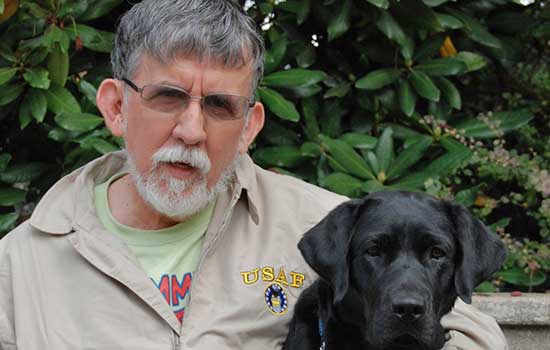Service Dogs Help Veterans with Post-Traumatic Stress Disorder
Stories - Jan 14 2015

She had only 20 minutes to testify, but it was plenty of time for Dr. Carla Green, a researcher with the Kaiser Permanente Center for Health Research, to deliver a powerful message to an Oregon legislative subcommittee: Veterans with specially trained service dogs have fewer symptoms of Post-traumatic stress disorder, less depression, better interpersonal relationships and lower levels of substance abuse.
Those are the early findings from Green’s Pairing Assistance-Dogs with Soldiers or (PAWS) study, a one-year project that aims to determine if service dogs can improve the symptoms of PTSD.
Lawmakers were introduced to the idea of providing service dogs to veterans last year when a Keizer-based organization asked them to fund a study in which dogs would be paired with five veterans. But once Joys of Living Assistance Dogs learned that Kaiser Permanente’s Community Benefit fund was willing to pay for a larger study, with dogs going to 11 veterans in Oregon and 10 in Georgia, the organization dropped its legislative request.
“We realized we didn’t have the expertise to do a study like this, and we were thrilled when we learned that Kaiser Permanente was willing to do the study and to fund it,” said Lori Sattenspiel, Joys of Assistance Living Dogs board chair who introduced Green to the legislative committee.
“These dogs can cost upwards of $10,000 to breed and train, and before the U.S. Department of Veterans Affairs will pay for the dogs, it wants evidence that they will actually improve symptoms of PTSD. Although there are many anecdotal reports, ours is the first study we know of to provide any systematic evidence,” Green told lawmakers.
She also reminded the lawmakers that although the VA pays for service dogs for veterans with specific physical disabilities, it does not pay for service dogs for those with mental disabilities.
In addition to early study results, Green described veterans’ personal experiences with their service dogs. One said his dog allowed him to stop taking some of his psychiatric medications. Another said his dog made it possible for him to go out in public, and a third said that his dog wakes him from nightmares, something no psychiatric medication will ever be able to do.
Green said service dogs may not be that expensive when compared to the cost of drug treatments and therapies now used for PTSD. In most cases, she said, the dogs would be an adjunct to other therapies, although they sometimes might be used as an alternative therapy.
Final results of the PAWS study should be published in early 2016, and the research center hopes to use those results to obtain federal funding to pursue a larger, randomized clinical trial.
In the meantime, the VA announced recently that it would resume its own study of service dogs for PTSD. That study was halted in 2012 amid concerns about how service dogs in the study were being treated and trained.